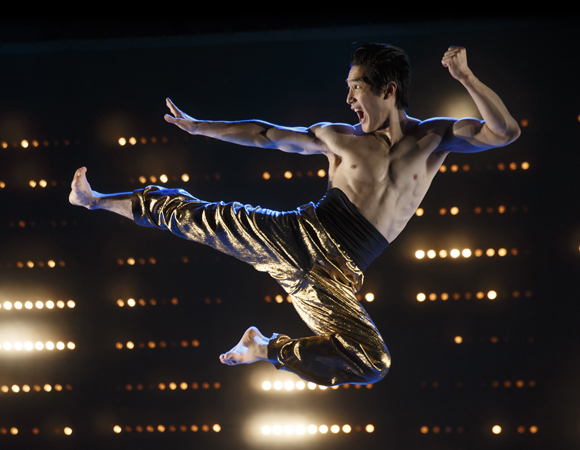Kung Fu

(© Joan Marcus)
The life of martial arts legend Bruce Lee seems like it would be a natural fit for David Henry Hwang, a playwright whose canon of work largely examines Asian masculinity and the ways in which Chinese-Americans reconcile their cultural and adopted homes. After all, Lee’s actual experiences parallel these two aspects: He was raised in China and sent to America by his parents (where he found notoriety as a performer), but he could achieve his greatest success only after returning to Hong Kong.
Hwang first attempted to put Lee’s life onstage as a musical, collaborating with the composer-lyricist David Yazbek on the announced-for-Broadway title Bruce Lee: Journey to the West. Like many projects, that was eventually scrapped, with Hwang, the award-winning author of M. Butterfly, Golden Child, and Chinglish, seeking a different way into the story. The result is Kung Fu, Hwang’s long-awaited Bruce Lee bio-play, directed by Leigh Silverman as the final entry in Hwang's residency at Signature Theatre.
The crux of Kung Fu is the troubled relationship between Bruce (Cole Horibe) and his father, Cantonese opera singer Hoi-Chuen (Frances Jue). After getting hauled in by the police one too many times for street fighting, 18-year-old Bruce was sent by his parents to America in 1959, where he quickly took up teaching martial arts. It was in one of his classes that he met Linda (Phoebe Strole), a student who would become his wife, and through a series of lucky circumstances, this talented fighter would gain notoriety as Kato, the masked sidekick of the ABC television series The Green Hornet.
Cramming over 20 years (the play ends before Lee’s untimely death at age 32) into two hours leaves little room for depth, and Hwang, disappointingly, falls into the same traps as so many other playwrights who write bio-shows. Lee’s life becomes a series of bullet points, hit upon quickly and vanishing even faster in order to get to the next. At times, Kung Fu even plays like the libretto for a musical, but without the songs (it’s easy to see where certain numbers would go: the love song for Bruce and Linda, the reconciliation tune for Bruce and his father’s ghost).
An inherent lack of subtext makes it difficult for the actors to fully flesh out their characters. Usually reliable performers like Jue and Strole are trapped in the archetypes of villain and doting wife (respectively) and cannot escape because their material is underwritten. Nonetheless, Horibe, a runner-up on TV's So You Think You Can Dance, makes an impressive acting debut, imbuing Bruce with a fine mix of cockiness and self-doubt (and he’s tremendous in the "fight scenes" by Sonya Tayeh, choreographed to mix martial arts and contemporary modern dance). A nine-member ensemble fills in various other roles, including Bruce’s longtime pal Toshi (Peter Kim, endearing in a nerdy way) and the cowboy movie star James Coburn, played by the African-American actor Clifton Duncan in a strange bit of colorblind casting that, owing to the strength of his humorous performance, actually works in capturing the tall and handsome Oscar winner.
While David Zinn’s unit set, a graying karate studio, is mostly wrong for a play with multiple locations, Silverman’s staging on the wide-open space plays like gangbusters. Blending traditional American theater styles with Tayeh’s inventive movements, an original underscore by Du Yun, and techniques of Chinese opera (for which Jamie Guan is billed as "specialist"), Kung Fu moves at a fast clip and is often exhilarating to watch. If only there was a bit more substance.











